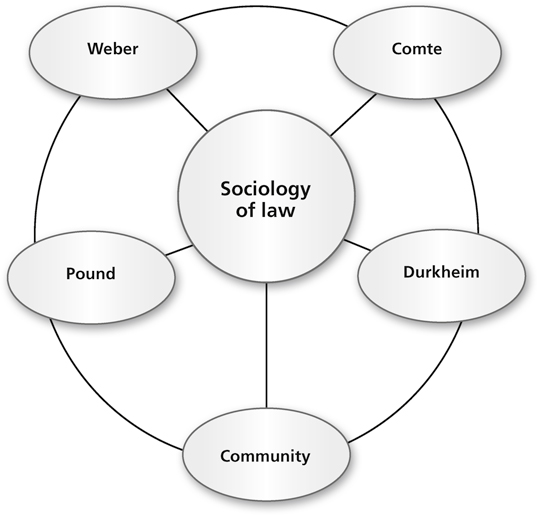Sociology of law and Marxism

Sociology of Law and Marxism

8.1 Objectives of Sociological Study
1. Sociology is the scientific study of human behaviour, especially with regard to analysis of its:
(a) origins
(b) organisation
(c) institutions
(d) development of human society.
2. Such study may address general areas of academic knowledge, e.g.:
(a) economics
(b) politics
(c) law.
3. More particularly, thereafter the study may focus on specific problems, e.g.:
 crime
crime
 child abuse
child abuse
 divorce.
divorce.
4. Although in the past not identified and named as sociology, many philosophical writers have in fact considered law in its social context, from the Greeks (Plato) through to Hobbes, Locke, Montesquieu and Rousseau.
5. In the 19th century, political science was sufficiently advanced to differentiate society in a broad sense from what was originally identified as the Crown and later the state, and this led to the birth of modern sociology, and hence sociology of law.
6. Writers who led in this field included:
 Emmanuel Joseph Sieyes (1748–1836) seems to have been the first writer to use the term ‘sociologie’ which was then taken up by August Comte (1798–1857) (section 4.2) in 1838 and whose purpose was to identify and explain the principal stages of human development
Emmanuel Joseph Sieyes (1748–1836) seems to have been the first writer to use the term ‘sociologie’ which was then taken up by August Comte (1798–1857) (section 4.2) in 1838 and whose purpose was to identify and explain the principal stages of human development
 Karl Marx (1818–83), for whom law was only one of the criteria meriting consideration in achieving what he thought to be more important historical, economic and political objectives
Karl Marx (1818–83), for whom law was only one of the criteria meriting consideration in achieving what he thought to be more important historical, economic and political objectives
 Emile Durkheim (1858–1917), who was instrumental in using the scientific methodology of gathering empirical statistical evidence to provide material on which to base his study of society
Emile Durkheim (1858–1917), who was instrumental in using the scientific methodology of gathering empirical statistical evidence to provide material on which to base his study of society
 Max Weber (1864–1920), who considered a variety of theoretical aspects of social organisation
Max Weber (1864–1920), who considered a variety of theoretical aspects of social organisation
 Roscoe Pound (1870–1964) was also associated with the sociology of law.
Roscoe Pound (1870–1964) was also associated with the sociology of law.
7. It is not possible to deal with sociology of law in more detail here, but some writers categorised under other headings e.g. realism such as Holmes (section 9.2.4) and Llewellyn (section 9.2.5) have affinities with a sociological approach, whilst Pound is also regarded as a realist.
8.2 Pound
1. Legal philosophy has been addressed from a variety of traditional viewpoints, and social science has provided some useful examples, particularly sociology and economics.
2. Roscoe Pound (1870–1964) dealt with the methodology in Social Control Through Law (1942), categorising law and treating it as the prime means of achieving social control within society, as opposed to grounding it in natural law, religious or more general moral criteria.
3. This reflects previous writings from the early decades of the twentieth century, such as Law and Liberty (1914), where he identified a new understanding of the social-philosophical school, arguing that:
(a) previous dominance of self-assertion no longer prevailed
(b) future juristic policy would be founded on the need to secure claims of society at large, i.e. social and public claims.
4. He brings together the different meanings of law, substance and method into a regulatory regime based on principles and process.
5.